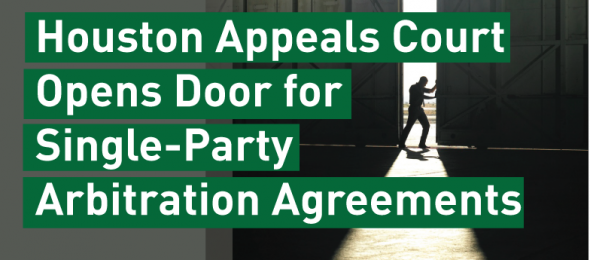Houston’s 14th District Appeals Court has reversed a district court’s order denying a company’s motion to compel arbitration. In Cotton Commercial USA, Inc. v. Clear Creek Independent School Dist. (Tex.App.–Houston [14 Dist.], 2012), the Clear Creek Independent School District (“School District”) contracted with Cotton Commercial USA, LP (“Contractor”) for debris removal following Hurricane Ike. A restoration services agreement signed by the parties contained an agreement to arbitrate any disputes related to work performed as part of the contract. In addition, the agreement specifically authorized the use of subcontractors to complete the work and provided for a 20 percent mark-up where a subcontractor was used.
In September 2008, the hurricane debris was reportedly removed by Cottonwood Debris Company, LLC (“Subcontractor”). After Contractor submitted bills that included a mark-up for Subcontractor’s services, the School District questioned the relationship of the two parties and refused to pay the mark-up rate. The School District also alleged that Subcontractor submitted a number of fraudulent invoices for work that was never performed. Contractor and Subcontractor were later merged to form Cotton Commercial USA, Inc. (“Cotton Commercial”).
In December 2010, the School District filed a lawsuit against Cotton Commercial alleging fraud. In May 2011, Cotton Commercial filed a motion to stay court proceedings and compel the dispute to arbitration. The company also asserted a number of counterclaims against the School District. The district court denied Cotton Commercial’s motion to compel arbitration with regard to the School District’s claims against the company and granted Cotton Commercial’s motion related to the company’s counterclaims. Cotton Commercial then appealed the trial court’s order denying the company’s motion to compel the parties to arbitration over the School District’s claims. The School District did not appeal either of the lower court’s orders.
On appeal, the School District argued that it filed a lawsuit against Cotton Commercial because Subcontractor was merged with the company and ceased to exist. In addition, the School District stated it should not be compelled to arbitrate because there was no contract between the two parties. According to Houston’s 14th District, although an agreement to arbitrate is generally only enforced between signatories, exceptions do exist. Despite that a corporate relationship between Cotton Commercial, Contractor, and Subcontractor “is insufficient to compel arbitration,” the court stated,
…the Texas Supreme Court recognizes an “intertwined-claims” test that has been applied by other courts in circumstances where a nonsignatory defendant has a “close relationship” with one of the signatories and the claims are “‘intimately founded in and intertwined with the underlying contract obligations.’”
After finding the School District’s claims were “completely interwoven” with the parties’ restoration services agreement, the appeals court said,
The School District is a signatory to the Restoration Agreement. The School District agreed to arbitrate “any controversy, dispute or claim arising out of [the Restoration Agreement] or the Work done [thereunder].” The School District cannot artfully choose its defendant or plead its claims to avoid arbitration.
In addition, the court dismissed the School District’s public policy argument by stating,
It would be contrary to Texas policy favoring arbitration and against artful pleading to avoid arbitration to allow the School District to avoid its agreement to arbitrate claims or to piecemeal such claims in two forums simply because its contracting counterpart has merged with another company.
Next, the appellate court addressed the scope of the parties’ agreement to arbitrate. According to the court, the arbitration agreement at issue was extremely broad and the factual allegations in the complaint were sufficient to prove the dispute fell within the scope of the agreement.
Finally, Houston’s 14th District Appeals Court reversed the district court’s order denying Cotton Commercial’s motion to compel arbitration with regard to the School District’s claims against the company and remanded the case.














